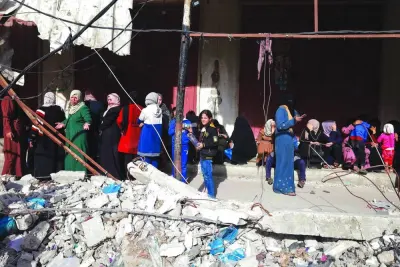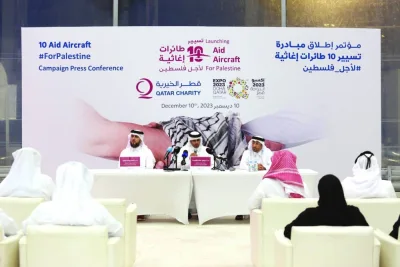
A Palestinian boy, injured following Israeli strikes on Al-Maghazi refugee camp, receives care at Al-Aqsa hospital in Deir Balah in the central Gaza Strip yesterday. (AFP)
Hunger is spreading among the besieged enclave’s civilian population in Gaza.
Amid the worsening humanitarian crisis, Hamas fighters and Israeli troops fought across the territory, with the fighters trying to block Israeli tanks from advancing through the shattered streets.
The Gaza health ministry said 18,205 people had now been killed and 49,645 wounded in Israeli strikes on Gaza in just over two months — hundreds of them since the United States vetoed a proposal for a ceasefire at the United Nations Security Council on Friday.
Most of Gaza’s 2.3mn people have been driven from their homes and residents say it is impossible to find refuge or food in the densely populated coastal enclave.
One Palestinian told Reuters he had not eaten for three days and had to beg for bread for his children.
“I pretend to be strong but I am afraid I will collapse in front of them at any moment,” he said by telephone, declining to be named for fear of reprisals.
UNRWA, the UN body responsible for Palestinian refugees, said some people were arriving at its health centres and shelters carrying their dead children.
“We are on the verge of collapse,” it said on X.
Aid agencies have also warned of a breakdown in social order as the situation worsens.
Over the weekend UN Secretary-General Antonio Guterres said he feared a mass displacement into Egypt and UNRWA commissioner general Philippe Lazzarini said that pushing Gazans closer to the border pointed to attempts to move them over it.
Jordan also accused Israel of seeking “to empty Gaza of its people”.
The Israeli government yesterday denied this was its aim.
The border with Egypt is the only way out of Gaza at present, but Cairo has warned it will not allow Gazans into its territory, fearing they would not be able to return.
UN officials say 1.9mn people — 85% of Gaza’s population — are displaced and describe the conditions in the southern areas where they have concentrated as hellish.
Gazans said people forced to flee repeatedly were dying of hunger and cold as well as the bombardments, describing looting of aid trucks and sky high prices. The UN World Food Programme has said half of the population is starving.
Israel says its instructions to people to move areas are among measures to protect the population.
UN Security Council envoys spoke of unimaginable suffering and urged an end to the war when they visited the Egyptian side of the Rafah border crossing yesterday.
Asked by reporters if he had a message to nations that opposed a ceasefire in Gaza, China’s United Nations envoy Zhang Jun said simply: “Enough is enough.”
Yesterday, fighters and residents said fighters were preventing Israeli tanks moving farther west and clashing with Israeli forces in northern Gaza, where Israel had said its mission was largely complete.
The armed wing of Hamas said it had fired rockets towards Tel Aviv, where Israelis fled to shelters. The Gaza health ministry said 32 Palestinians were killed in Khan Younis overnight. Hamas said its fighters had hit two Israeli tanks with rockets and fired mortars at Israeli forces.
Fighting also intensified in Shejaia, east of the center of Gaza City, the northwestern Sheikh Radwan district and Jabalia farther north, fighters and residents said.
In central Gaza, where Israel told people to move yesterday towards shelters in the Deir al-Balah area, health officials said the Shuhada Al-Aqsa hospital had received 40 dead.
Medics also said an Israeli air strike killed four in a house in Rafah, one of two places near Egypt where Israel says Palestinians should take refuge.
In another flashpoint area, an Israeli shell yesterday killed the mayor of the Lebanese village of Taybeh a few kilometres from the border with Israel, a relative and Lebanon’s National News Agency said.
Amid the worsening humanitarian crisis, Hamas fighters and Israeli troops fought across the territory, with the fighters trying to block Israeli tanks from advancing through the shattered streets.
The Gaza health ministry said 18,205 people had now been killed and 49,645 wounded in Israeli strikes on Gaza in just over two months — hundreds of them since the United States vetoed a proposal for a ceasefire at the United Nations Security Council on Friday.
Most of Gaza’s 2.3mn people have been driven from their homes and residents say it is impossible to find refuge or food in the densely populated coastal enclave.
One Palestinian told Reuters he had not eaten for three days and had to beg for bread for his children.
“I pretend to be strong but I am afraid I will collapse in front of them at any moment,” he said by telephone, declining to be named for fear of reprisals.
UNRWA, the UN body responsible for Palestinian refugees, said some people were arriving at its health centres and shelters carrying their dead children.
“We are on the verge of collapse,” it said on X.
Aid agencies have also warned of a breakdown in social order as the situation worsens.
Over the weekend UN Secretary-General Antonio Guterres said he feared a mass displacement into Egypt and UNRWA commissioner general Philippe Lazzarini said that pushing Gazans closer to the border pointed to attempts to move them over it.
Jordan also accused Israel of seeking “to empty Gaza of its people”.
The Israeli government yesterday denied this was its aim.
The border with Egypt is the only way out of Gaza at present, but Cairo has warned it will not allow Gazans into its territory, fearing they would not be able to return.
UN officials say 1.9mn people — 85% of Gaza’s population — are displaced and describe the conditions in the southern areas where they have concentrated as hellish.
Gazans said people forced to flee repeatedly were dying of hunger and cold as well as the bombardments, describing looting of aid trucks and sky high prices. The UN World Food Programme has said half of the population is starving.
Israel says its instructions to people to move areas are among measures to protect the population.
UN Security Council envoys spoke of unimaginable suffering and urged an end to the war when they visited the Egyptian side of the Rafah border crossing yesterday.
Asked by reporters if he had a message to nations that opposed a ceasefire in Gaza, China’s United Nations envoy Zhang Jun said simply: “Enough is enough.”
Yesterday, fighters and residents said fighters were preventing Israeli tanks moving farther west and clashing with Israeli forces in northern Gaza, where Israel had said its mission was largely complete.
The armed wing of Hamas said it had fired rockets towards Tel Aviv, where Israelis fled to shelters. The Gaza health ministry said 32 Palestinians were killed in Khan Younis overnight. Hamas said its fighters had hit two Israeli tanks with rockets and fired mortars at Israeli forces.
Fighting also intensified in Shejaia, east of the center of Gaza City, the northwestern Sheikh Radwan district and Jabalia farther north, fighters and residents said.
In central Gaza, where Israel told people to move yesterday towards shelters in the Deir al-Balah area, health officials said the Shuhada Al-Aqsa hospital had received 40 dead.
Medics also said an Israeli air strike killed four in a house in Rafah, one of two places near Egypt where Israel says Palestinians should take refuge.
In another flashpoint area, an Israeli shell yesterday killed the mayor of the Lebanese village of Taybeh a few kilometres from the border with Israel, a relative and Lebanon’s National News Agency said.
 Kokani.me Kokani.me
Kokani.me Kokani.me



